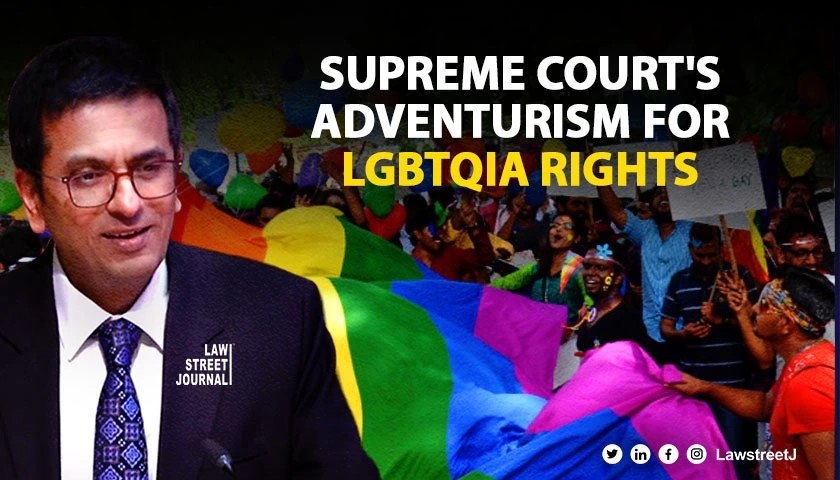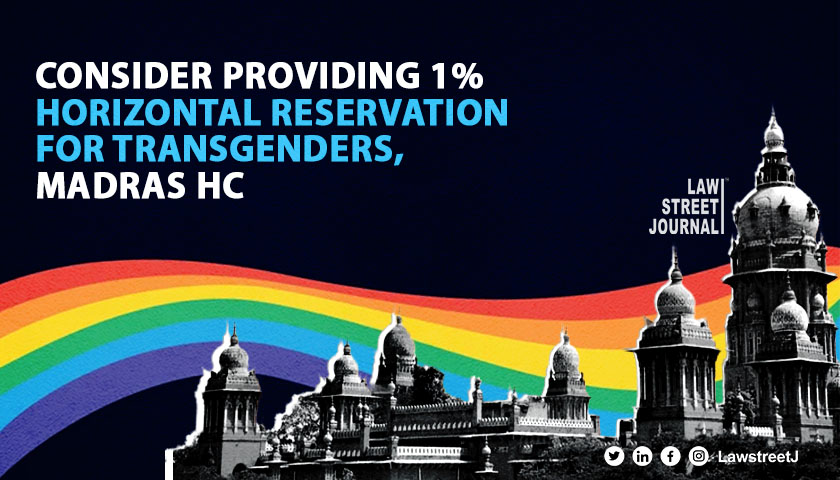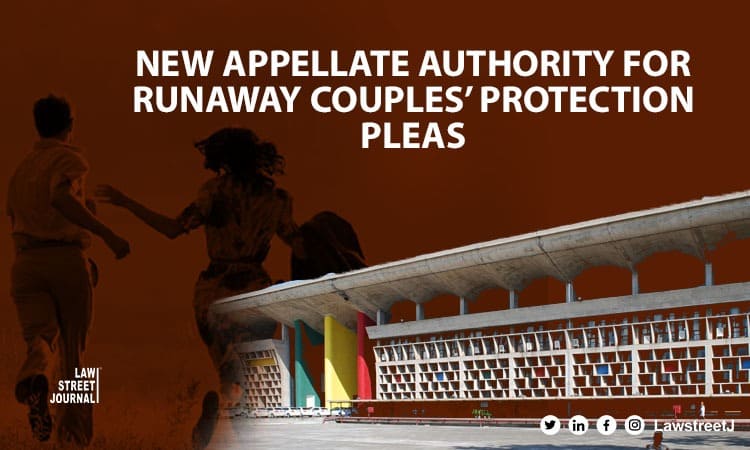Sometimes, in the quest of justice, judges end up doing injustice by substituting their own subjective values with the Constitutional values.
The case of Devu G Nair Vs. State of Kerala & Ors. [SLP (Cri.) No. 1891/2023] is a classic example of the same. In this case, Honble Apex Court has laid down guidelines for the High Courts across the nation with respect to Habeas Corpus and protection petitions related to LGBTQ community. These guidelines were both unwarranted and outside the jurisdiction of the court.
Courts cannot travel beyond the scope of law
The matter came up before Apex Court against an interim order of the Kerala High Court in a writ of Habeas Corpus filed by a female petitioner. She alleged that her intimate partner (another female) was being unlawfully detained by her parents, despite her wish to stay with the petitioner.
The scope of a Habeas Corpus petition is limited to determining whether a person is being unlawfully detained or not. If the answer to that question is negative, then the matter is closed by the court. A thorough inquiry was conducted by Supreme Court to ascertain whether the girl was unlawfully detained by her parents and found that the girl was living with her parents of her own volition and nobody has illegally detained her. Therefore, the matter should have been concluded as the parents have not detained her.
However, Supreme Court while closing the matter passed certain guidelines which were neither prayed for in the petition nor within its scope under Article 136 of the Constitution.
The scope of petition was limited i.e., to ascertain whether the girl was illegally detained by her parents or not. The SLP was nothing but a frivolous petition to defame the girls parents. It was not a PIL for issuing guidelines concerning rights of LGBTQ community. However, instead of limiting its intervention to the specific matter at hand, the Supreme Court went on to issue guidelines regarding Habeas Corpus and Protection petitions concerning the LGBTQ community nationwide. This extension of jurisdiction was both unnecessary and beyond the authority of the Court.
Supreme Court can only adjudicate on an issue when it is within its scope. It cannot travel beyond the scope of the case just to impose its own subjective values on the citizens of this country. The issuance of guidelines based on a hypothetical scenario not raised in the petition indicates an overreach by the Supreme Court into the legislative domain. While there may be certain pressing issues requiring attention, the Court cannot unilaterally legislate on matters that have not even come up for consideration before it. The question whether the Court should deal with an issue not arising for consideration came up before Supreme Court in the case of Sanjeev Coke Manufacturing Company Vs. Bharat Coking Coal Ltd. & Anr. (1983) 1 SCC 147, a Constitution Bench of Apex Court while dealing with the issue, upheld that:
We have serious reservations on the question whether it is open to a court to answer academic or hypothetical questions on such considerations, particularly so when serious constitutional issues are involved. We (Judges) are not authorized to make disembodied pronouncements on serious and cloudy issues of constitutional policy without battle lines being properly drawn. Judicial pronouncements cannot be immaculate legal conceptions. It is but right that no important point of law should be decided without a proper lis between parties properly ranged on either side and a crossing of the swords. We think it is inexpedient for the Supreme Court to delve into problems which do not arise and express opinion thereon.
Therefore, Supreme Court's issuance of guidelines in this case represents an overstep of its authority and undermines the principles of judicial restraint and separation of powers.
Misuse of Article 142, Constitution of India
The next question that arises is, can Supreme Court issue such guidelines under Article 142 of the Constitution. Before answering that we need to understand the power of Supreme Court under Article 142. Supreme Court under Article 142 can make an order to do complete justice between the parties. The pre-requisite for issuance of any guidelines under Article 142 is that they must be issued to do complete justice between the parties otherwise, Supreme Court has no power to issue guidelines for the general public or to any institution by resorting to Article 142. However, since nobody was illegally detained in this case, there was no issue which was required to be adjudicated by Supreme Court between the parties and therefore, Supreme Court has not even entertained the SLP.
Therefore, the guidelines were not passed to address any specific issue between the parties in the SLP. Consequently, no directions can be issued for the general public under Article 142 when there is no direct adjudication between parties. Apex Court has discussed the scope of power under Article 142 of the Constitution in the case of High Court Bar Association, Allahabad Vs. State of UP & Ors. [Criminal Appeal 3589/2023] and upheld that:
(i) The jurisdiction can be exercised to do complete justice between the parties before the Court. It cannot be exercised to nullify the benefits derived by a large number of litigants based on judicial orders validly passed in their favour who are not parties to the proceedings before this Court;
(ii) Article 142 does not empower this Court to ignore the substantive rights of the litigants;
(iii) While exercising the jurisdiction under Article 142 of the Constitution of India, this Court can always issue procedural directions to the Courts for streamlining procedural aspects and ironing out the creases in the procedural laws to ensure expeditious and timely disposal of cases. However, while doing so, this Court cannot affectthe substantive rights of those litigants who are not parties to the case before it. The right to be heard before an adverse order is passed is not a matter of procedure but a substantive right; and
(iv) The power of this Court under Article 142 cannot be exercised to defeat the principles of natural justice, which are an integral part of our jurisprudence. In a nutshell, Article 142 cannot be used to indirectly achieve objectives that cannot be attained directly. By issuing the guidelines in question, the Supreme Court may have overstepped its bounds and encroached into the legislative/executive domain. This raises an important question regarding the separation of powers and the role of the judiciary in shaping public policy.
Police protection on mere filing of a petition
The guidelines mandate that a court while dealing with a petition for police protection by intimate partners on the grounds that they are a same sex, transgender, inter-faith or inter-caste couple must grant an ad-interim measure, such as immediately granting police protection to the petitioners, before establishing the threshold requirement of being at grave risk of violence and abuse.
As per the above-mentioned guideline, mere filing of a petition entitles the petitioner for police protection regardless of the fact whether he is at grave risk of violence or not. Under Article 226, High Courts have the authority to decide whether police protection should be granted as an interim measure or not, considering all relevant facts and circumstances. However, these guidelines restrict that discretion, compelling High Courts to grant police protection without proper evaluation. This encroachment on the jurisdiction of High Courts overlooks the basic structure of the Constitution and fails to recognize the importance of applying judicial discretion and the principle of due process.
Additionally, the guidelines disregard the established process wherein individuals first approach the police for protection, and only if dissatisfied, seek relief from the High Court.
Furthermore, by mandating immediate police protection without considering the actual risk, these guidelines could potentially strain state resources and lead to protection being granted to individuals with unsubstantiated claims. This not only undermines the credibility of the threat analysis mechanism but also creates a legal right for certain couples, effectively engaging in judicial legislation.
In essence, the guidelines effectively legislate a legal right to police protection for specific groups of individuals, bypassing the established judicial process. This encroachment on the jurisdiction of the legislative and executive branches highlights the need for caution in issuing such directives and underscores the importance of upholding the principles of separation of powers and due process in the legal system.
Implications of prioritizing LGBTQ-related cases
Supreme Court has directed that Habeas Corpus and Protection petitions related to LGBTQ community must be given a priority in listing and hearing. By giving a special privilege of priority, Supreme Court has virtually declared non-LGBTQ litigants as secondary citizens. Every Habeas Corpus case demands serious attention, regardless of the identity of the individuals involved. While LGBTQ individuals undoubtedly face unique challenges, they are not the sole vulnerable class.
Scheduled Castes, Scheduled Tribes, minorities, citizens below the poverty line, and women also confront significant vulnerabilities. By singling out LGBTQ litigants for priority treatment, the Supreme Court may have unintentionally compromised the rights of non-LGBTQ litigants guaranteed by the Constitution's Part III. By giving special privilege of listing and hearing to one class of citizens (i.e., LGBTQ), Supreme Court has violated the equality principle and eventually the basic structure of the constitution.
Furthermore, the judges of each court are best equipped to decide which litigant's case should be given priority in terms of listing and hearing. Therefore, it is best to let individual courts decide which cases should be given priority. Just because a petitioner belongs to the LGBTQ community, their case shouldn't automatically jump the line while others wait. The Supreme Court should not interfere with the day-to-day functioning of the other Courts by picking and choosing which cases be listed and decided out of turn. The Judges of the High Courts should be allowed to set their priorities on a rational basis unless there are very extraordinary circumstances.
All cases should be treated equitably and decided based on their individual merits, without discrimination based on the identity of the litigants involved.
While recognizing the unique challenges faced by LGBTQ individuals, it's imperative to uphold the principle of equality enshrined in the Constitution and ensure fairness in the administration of justice.
Child rights at stake
The guidelines also mandate that- the minority of the detained or missing person must not be used, at the threshold, to dismiss a habeas corpus petition against illegal detention by a natal family.
However, in formulating this guideline, the Supreme Court overlooked the provisions of THE JUVENILE JUSTICE (CARE AND PROTECTION OF CHILDREN) ACT, 2015.
According to Section 2(14) of this Act, a child who is illegally detained, missing, or a runaway is considered a child in need of care and protection. Each district has a Child Welfare Committee tasked with ensuring the welfare of such children. Hence, petitions concerning such children should be directed to the Child Welfare Committee, and the court should dismiss them at the outset. It's a well-established legal principle that if an alternative remedy is available, such as the Child Welfare Committee, the High Court should refrain from interfering.
Furthermore, the guidelines mandate immediate release if a detained or missing person expresses a desire not to return to their natal family. However, this directive overlooks the fact that a minor may not always be capable of making the best decisions for their well-being. In such cases, the minor could be unjustly removed from their family, opening the door to potential manipulation by individuals unrelated to the family, and in the worst case scenario to their abuse and exploitation.
The court should consider not only the child's desire but also the availability of a suitable environment and the means of the person intending to care for the child. The Child Welfare Committee is better equipped to make such decisions, ensuring the child's welfare until they reach adulthood. The primary objective until the age of 18 should be providing the child with a good education, upbringing, and moral values, prioritizing their long term well-being over immediate desires, such as being with an intimate partner.
Blanket Ban for Counselling
The guidelines also mandate that the Court shall not pass any directions for counselling or parental care when the corpus is produced before the Court. Imposing a blanket ban on counseling appears illogical and unreasonable.
Consider the case of the girl who is the respondent in the case of Devu G Nair Vs. State of Kerala. Suppose she identifies as bisexual and was involved in relationships with both the petitioner girl and a boy. While her family may accept her sexual orientation, they may not validate polyamory, and the respondent desires to maintain relationships with both partners simultaneously.
In such a complex scenario, counseling could offer valuable support, especially considering societal norms around polyamorous relationships. However, the Supreme Court's refusal to recognize such cases suggests a lack of acknowledgment of these complexities. Moreover, the guidelines also prohibit counseling for mentally retarded individuals and children. This restriction is concerning as counseling could potentially be beneficial for individuals with mental disabilities and children facing various challenges. By banning counseling in these cases, the guidelines overlook the potential benefits and support that counseling could provide to these vulnerable individuals. Therefore, the guidelines' failure to recognize the potential benefits of counseling in these situations highlights a need for reconsideration and a more nuanced approach to addressing the needs of individuals with diverse circumstances.
In conclusion, the guidelines fail to account for the nuances and complexities of the issues at hand, particularly concerning LGBTQ rights, child welfare, and counseling. By imposing blanket directives without consideration for individual circumstances, the Court overlooks the diverse needs and vulnerabilities of the parties involved.
In light of above-mentioned concerns, it is imperative for the judiciary to exercise caution and adhere to the principles of judicial restraint and separation of powers. While recognizing the importance of addressing pressing societal issues, the Court must ensure that its interventions are within the bounds of its authority and do not infringe upon the rights and liberties of the citizens. Only by upholding these principles can the judiciary fulfill its role as a guardian of justice and protector of constitutional values.
(Disclaimer: Opinions and views expressed are solely those of the author and do not necessarily reflect the views of LawStreet Journal.)


![Supreme Court Rejects Expansion of Workplace Harassment Laws to Include LGBTQIA+ Community [Read Order]](/secure/uploads/2023/11/lj_5643_d171f849-3337-4278-b763-77cb6efd56a4.jpg)


![State's purported commitment to inclusivity and empowerment: Madras HC lauds TN Govt For New LGBTQIA+ Draft Policy [Read Order]](/secure/uploads/2024/01/lj_2135_b8b344d4-db0a-4129-a8ad-47cc2f62a678.jpg)






